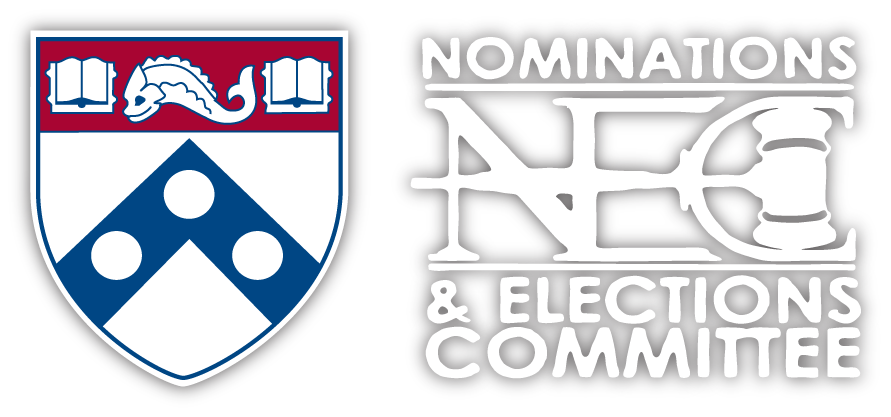About Us
The Nominations and Elections Committee was founded in 1970 to confront issues of equity and representation within both the Penn administration and the elected student government branches. Our overarching goal is to provide every undergraduate with the opportunity to voice their concerns to administrators and represent their peers as elected representatives.
The three pillars of our organization are as follows:
Nominations: The NEC is tasked with interviewing and appointing non-elected student representatives to dozens of university committees. The biggest responsibility bestowed upon us is the appointment of representatives of mis- and underrepresented constituencies to the University Council. The University Council is the highest administrative body at Penn with its members including the University President, Provost, and other influential administrators. Each year, the NEC interviews, evaluates, and appoints representatives of constituencies; these representatives can then advocate for their communities’ needs and obtain essential resources. Our current slate of representatives can be found here.
The NEC is also responsible for appointing undergraduate representatives to various committees which we describe as University-Wide Committees. We run interview processes every fall and spring for committees such as the Dining Advisory Board, the Student Health Insurance Advisory Committee, the University Council Committee on Diversity and Equity, and many more. To ensure the fairness of our nominations processes, we conduct internal bias training where we learn to interrogate our own biases and respectfully navigate complex issues of personal and group identity.
Elections: To prevent coercion, defeat nepotism, and support the right of every undergraduate to pursue an elected office, the NEC facilitates and oversees fair and free elections for the Undergraduate Assembly (UA) and Class Boards. In the fall, we run New Student Elections for UA New Student Representatives (9 seats; 8 for freshmen and 1 for a transfer student) and the freshman Class Board. In the spring, we run General Elections for all UA and Class Board positions (including UA President and Vice-President). To ensure unbiased elections, we institute a spending limit for campaigns and hold all candidates to a set of rules known as the Fair Practices Code. If candidates are suspected to have violated the Fair Practices Code, the NEC conducts a hearing to determine whether that candidate made a violation and whether that violation impacted the election. The NEC also conducts referenda whenever necessary and steps in to run internal elections for other clubs when possible.
Education: The NEC is empowered to educate the student body about current PSG initiatives and facilitate collaboration among the six branches of PSG. Externally, the NEC organizes PSG Week, which is a series of events meant to promote the progress of PSG and gather input from undergraduates about what initiatives they would like to see. The NEC’s Vice Chair for Education is also the Chair of PSG Steering, a gathering of the leadership of all six PSG branches which discusses issues affecting the undergraduate population. Internally, the Vice Chair for Education is responsible for educating our new members about NEC processes and facilitating new members’ transition onto the body.
Our membership consists of about 40 members each year with approximately 10 people per class. Our body meets every Monday at 9 PM to discuss and debate issues relating to nominations, elections, and education. We collect applications and conduct new member interviews every fall, and once someone is welcomed onto the body, they remain on the NEC until they graduate or resign. Our four-year membership makes our organization incredibly tight knit, with most NEC members referring to our group as their first family at Penn.
